  | | Friday, June 22, 2012 | From My ShelfFall Fiction, Part 2More books I'm looking forward to this fall: The Yellow Birds by Kevin Powers (Little, Brown, September 11) A debut novel that is one of the big "buzz" books among early readers and booksellers, it's a brilliant, elegiac account of two young men in the Iraq war--intense, poetic, tragic. Wanted Man by Lee Child (Delacorte Press, September 11) Do you even care about the plot? It's a new Jack Reacher! "All Reacher wanted was a ride to Virginia. All he did was stick out his thumb. But he soon discovers he has hitched more than a ride." The Cutting Season by Attica Locke (Harper, September 18) In 2009 Attica Locke dazzled with her debut novel, Black Water Rising; now she does it again with a mystery set on a present-day plantation in the South. A dead girl leads to politics, race, family and, of course, secrets. This is Dennis Lehane's first pick for his new imprint at HarperCollins. The Ruins of Lace by Iris Anthony (Sourcebooks Landmark, October 1) In the 1600s, the French had a passion for Flemish bobbin lace. The problem: in 1636, King Louis XIII prohibited making, buying and wearing lace. Anthony writes about the women making lace in Flemish convents, slowly going blind, the lace smugglers and the powerful buyers. Intricately woven and fascinating historical fiction. The Round House by Louise Erdrich (Harper, October 2) Someone whose judgment I trust said, "If possible, Erdrich is getting better." He was talking about this tale of a boy "on the cusp of manhood" who seeks justice and understanding in the wake of a terrible crime (a brutal attack on his mother) that upends and forever transforms his family. Live by Night by Dennis Lehane (Morrow, October 2) Boston during the Prohibiton Era: Joe Coughlin, the youngest son of a prominent police captain, climbs the ladder of organized crime, from his home city to Tampa to Havana. Lehane transforms the usual mix of love, betrayal, revenge and redemption into high art. --Marilyn Dahl, book review editor, Shelf Awareness | 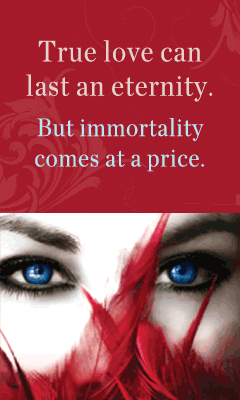

|
|
| 
|
| |
| 
|
| From Schuler Books & Music | Upcoming Events Josh Hoisington (28th St.) 06/22/2012 - 7:00PM Gregory Smith (28th St) 06/23/2012 - 1:00PM Fanged Fiction Book Group Meeting (Eastwood) 06/25/2012 - 7:00PM This month the Schuler horror reading group is looking at Ghost Story by Peter Straub. Each monthly selection is 20% off. Talk and Signing with Paul Vachon, author of Michigan's Upper Peninsula! (Okemos) 06/25/2012 - 7:00PM Born-and-raised Michigander Paul Vachon provides an insider's view of the Upper Peninsula, from the delicious meat-filled pasties the area is famous for to the tremendous natural beauty on display there. To ensure that every traveler finds the trip suited to their individual needs, Vachon also offers carefully designed itineraries such as Best of Michigan's Upper Peninsula, History Comes to Light, and Following the Lake Superior Trail. Complete with details on enjoying the tranquility of Tahquamenon Falls, boating at Indian Lake State Park, and exploring Mackinac Island, Moon Michigan's Upper Peninsula gives travelers the tools they need to create a more personal and memorable experience. Author Talk and Booksigning with Paul Vachon for his book Moon Michigan's Upper Peninsula (28th St.) 06/26/2012 - 7:00PM Born-and-raised a Michigander, Paul Vachon reveals the majestic, rugged, and stunningly beautiful side of his home state in this new guidebook, which provides an insider's view of the Upper Peninsula, from the delicious meat-filled pasties the area is famous for to the tremendous natural beauty on display there. Vachon offers carefully designed itineraries such as Best of Michigan's Upper Peninsula, History Comes to Light, and Following the Lake Superior. See more events >> | | | |
| 
|
| Further Reading: Religious SatireThis year marks 70 years since the publication of The Screwtape Letters, an epistolary novel by C.S. Lewis, which features witty yet diabolical advice from Screwtape, a world-wise devil, to his inexperienced nephew, Wormwood, a demon-in-training, in his quest to secure the damnation of an ordinary man. 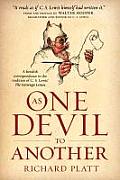 Richard Platt pays homage to the Lewis classic in his novel As One Devil to Another: A Fiendish Correspondence in the tradition of C.S. Lewis's The Screwtape Letters. Platt's underworldly grandmaster, Slashreap, mentors his nephew-protege Scardagger, a cadet fresh out of Temptation University. His tone is sharper than Screwtape's as he expounds upon contemporary demonic virtues and new tricks and strategies to corrupt 21st-century souls. Their aim is to steer one woman--an academic at an old and prestigious university--away from the tenets of heaven and into the clutches of hell. Richard Platt pays homage to the Lewis classic in his novel As One Devil to Another: A Fiendish Correspondence in the tradition of C.S. Lewis's The Screwtape Letters. Platt's underworldly grandmaster, Slashreap, mentors his nephew-protege Scardagger, a cadet fresh out of Temptation University. His tone is sharper than Screwtape's as he expounds upon contemporary demonic virtues and new tricks and strategies to corrupt 21st-century souls. Their aim is to steer one woman--an academic at an old and prestigious university--away from the tenets of heaven and into the clutches of hell.
The history of literary religious satire is long, perhaps originating with the medieval pilgrimage undertaken in The Canterbury Tales by Geoffrey Chaucer. Jonathan Swift parodied the rise of the Protestant Church via the lives of three brothers in A Tale of a Tub. Murderous criminals and brilliant policemen populate G.K. Chesterton's The Man Who Was Thursday, an allegorical Christian thriller infused with satiric elements. Mark Twain mocked the afterlife in Captain Stormfield's Visit to Heaven. Religious zealots, morality and ethics color all of Flannery O'Connor's darkly comic fiction. 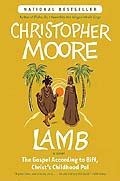 In Job: A Comedy of Justice, science fiction writer Robert A. Heinlein skewered American evangelical Christianity. And in Lamb: The Gospel According to Biff, Christ's Childhood Pal by humorist Christopher Moore, the 33 enigmatic years of Jesus Christ's life were revealed with clever sarcasm. In Job: A Comedy of Justice, science fiction writer Robert A. Heinlein skewered American evangelical Christianity. And in Lamb: The Gospel According to Biff, Christ's Childhood Pal by humorist Christopher Moore, the 33 enigmatic years of Jesus Christ's life were revealed with clever sarcasm. More recent literary religious satire seems more loosely constructed and anchored upon practical matters of faith: 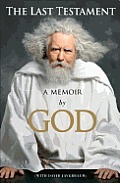 The Last Testament: A Memoir by God with David Javerbaum, is a pseudo-Bible where the Master of the Universe explains his zany system of logic, covering everything from sports, celebrities and social media to marriage, homosexuality and abortion. The Last Testament: A Memoir by God with David Javerbaum, is a pseudo-Bible where the Master of the Universe explains his zany system of logic, covering everything from sports, celebrities and social media to marriage, homosexuality and abortion.
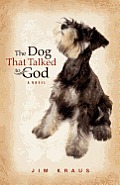 Rufus, a lovable talking Schnauzer who watches his weight, communicates the wisdom of the Divine to a widow who blames God for her grief in The Dog That Talked to God by Jim Kraus. Rufus, a lovable talking Schnauzer who watches his weight, communicates the wisdom of the Divine to a widow who blames God for her grief in The Dog That Talked to God by Jim Kraus.
 And only Anne Lamott, with her unusual brand of bittersweet humor, could conjure Jesus as "Casper the friendly savior" and describe God as "one crafty mother" in her personal essay collections such as Plan B: Further Thoughts on Faith. --Kathleen Gerard, blogger at Reading Between the Lines And only Anne Lamott, with her unusual brand of bittersweet humor, could conjure Jesus as "Casper the friendly savior" and describe God as "one crafty mother" in her personal essay collections such as Plan B: Further Thoughts on Faith. --Kathleen Gerard, blogger at Reading Between the Lines
|
| |
| Parmy Olson: Inside the Hacker Collective As a London correspondent, Parmy Olson used to cover a range of European business and financial stories for Forbes. Two years ago, though, she starting filing more stories about technology, "in particular disruptive people in the field of tech," and what started as a series of blog posts and magazine articles eventually became We Are Anonymous: Inside the Hacker World of LulzSec, Anonymous, and the Global Cyber Insurgency (Little, Brown). As a London correspondent, Parmy Olson used to cover a range of European business and financial stories for Forbes. Two years ago, though, she starting filing more stories about technology, "in particular disruptive people in the field of tech," and what started as a series of blog posts and magazine articles eventually became We Are Anonymous: Inside the Hacker World of LulzSec, Anonymous, and the Global Cyber Insurgency (Little, Brown).
What initially drew you to Anonymous and LulzSec as a story? I've always been fascinated by subcultures and secret communities and was intrigued when I first read news reports that painted Anonymous as a mysterious "group of hackers" that had come out of nowhere to disrupt the websites of major companies. | | |
| | | Never Been in Love I think about my opposite in the fictional world. He's a guy who says he's always wanted a family of his own, a partner to love, children to raise. But he's pushing 40 and is still solo. Forty isn't the end of the line by any means, but it's well north of the average age for first marriages and first children. I think about my opposite in the fictional world. He's a guy who says he's always wanted a family of his own, a partner to love, children to raise. But he's pushing 40 and is still solo. Forty isn't the end of the line by any means, but it's well north of the average age for first marriages and first children.
His name is Jake. He is successful and respected in corporate business. His personal life is a different story. He's been involved with many women. But this one lived in San Francisco and that one didn't click and the next one was married. He's felt initial stirrings he thought might be love, only to have them dissipate. He picked the wrong women or the wrong women picked him, leaving him essentially alone in the world, a difficult concept to grasp on a planet of seven billion people. And Jake is wondering: Why hasn't he met the right woman yet? And a darker, more fundamental question: Was there something inherently wrong with him, a flaw in his character that made him crave a permanent and loving relationship but unable to recognize or nourish one? Jake is one of the characters in Clean Break. He's not the main character, but he's the one who impacts the lives of the others, by witnessing and diffusing a violent argument between a married couple, Celeste and Adam, and then befriending Celeste in her quest to escape her marriage. But is he trapping himself in yet another situation of wrong woman, wrong place, wrong time? I once heard an author say that every character he created was one of his "unrealized selves." An imaginary self that you won't or can't become, yet whose life you can understand and experience. Jake, you are fascinating. I have empathy for your plight. But I'm glad I'm not you. --David Klein, author of Clean Break (Broadway) |
| |
| |  | We Only Know So Much by Elizabeth Crane |
| 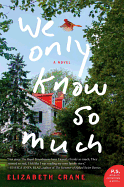 
| On the surface, the Copelands might appear to be a typical family in a small, Midwestern town. In the hands of Elizabeth Crane, however, their world is skewed by the absurdity and cruelty of life. The mother is numb from the suicide of her secret lover; her unaware husband, a walking Wikipedia, fears he might be losing his memory. Their daughter, an angst-ridden 19-year-old, longs for a "career" on reality TV, while their nine-year-old son is convinced he must choose between his love of crossword puzzles and girls. Add a grandfather suffering the tangled forgetfulness of Parkinson's disease and his mother, a 98-year-old matriarch whose sharp, keen mind enables her still to dream big, and what emerges in We Only Know So Much is an eccentric cast of characters whose lives are rife with conflict. Crane is an accomplished, prolific short story writer; in her debut novel, she makes painful issues accessible via a clever, original narrative voice that allows the reader to peek inside her characters. By accentuating their offbeat flaws and failures, Crane reveals a dark, yet endearing, sense of humanity. In the end, the "ordinary" aspects of living life, however dysfunctional, escalate until the novel reaches thought-provoking conclusions about the meaning of life. -- Kathleen Gerard, blogger at Reading Between the Lines Discover: Elizabeth Crane's first novel introduces us to a contemporary American family, unwinding their crisis narratives at a descriptive, unhurried pace. | Harper Perennial, $14.99 paperback, 9780062099471 |
The Red House by Mark Haddon |
| 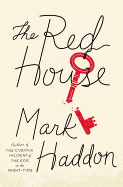 
| The Red House introduces us to Angela and Richard, estranged siblings who reunite at the funeral of their mother; perfunctory greetings are exchanged, and that seems to be that. The following week, however, Richard invites Angela and her husband, Dominic, and their three children--Alex (17), Daisy (16) and Benjy (8)--to a big house in Wales for a week. Despite misgivings, they agree, since they can't afford a vacation on their own. Richard is a wealthy physician who has recently acquired a new wife, Louisa, and her wretched teenage daughter, Melissa. The stage is set for all the long-held resentments between and among the parties to come to the fore. In the hands of Haddon (The Curious Incident of the Dog in the Night-Time and A Spot of Bother), we learn all about these eight people in a way that renders most of them sympathetic. We grieve with Angela, who has been hallucinating about her first child, stillborn 18 years ago. Dominic is preoccupied, wondering whether to break up with his girlfriend. Melissa and Daisy are up to some extraordinary things that come to a head in Wales. Young Benjy is full of monsters and superheroes and worried about everything, while Alex lusts for Melissa. In the best manner of first-rate storytelling, as the slowly revelatory tale unfolds, Haddon lets readers in on the fact that no one is quite what he or she seems to be. --Valerie Ryan, Cannon Beach Book Company, Oregon Discover: The neutral turf of a big house near the Welsh border brings together eight disparate members of an extended and blended family, with all their secrets and longings. | Doubleday, $25.95 hardcover, 9780385535779 |
The Meryl Streep Movie Club by Mia March |
| 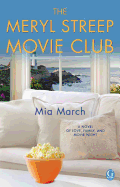 
| Although sisters June and Isabel grew up with their cousin Kat, they've always struggled to relate to her and to each other. When Kat's mother calls them back to her Maine inn for a shocking announcement, the three young women find themselves sharing a room for the first time in years and spending Friday nights together, watching Meryl Streep movies as each tries to sort out her own baggage. Stepford wife Isabel has discovered her husband is having an affair, even as she longs for children. June has begun searching for the father of her seven-year-old son, whom he has never met. And Kat is torn between running her mother's inn and marrying her lifelong best friend, or stepping outside her small, safe life to pursue bigger dreams. March's love for Meryl Streep shines through in her characters, all of whom see their lives reflected in Streep's movies, from Out of Africa to Postcards from the Edge to the especially apt It's Complicated. Over popcorn, they find themselves confiding in one another, opening up about family secrets long buried and sharing the convoluted truths of their lives. A few plot elements are predictable, but others lead to unexpected places, and readers will enjoy following the characters' intertwined journeys. Warmhearted and hopeful, March's tribute to good movies, family and new beginnings will motivate readers to invite their girlfriends over for a bowl of popcorn, a glass of wine and any movie starring the inimitable Meryl Streep. --Katie Noah Gibson, blogger at Cakes, Tea and Dreams Discover: A charming debut novel about family, new beginnings and navigating life changes with some help from Meryl Streep's movies. | Gallery Books, $15 paperback, 9781451655391 |
Tell the Wolves I'm Home by Carol Rifka Brunt |
| 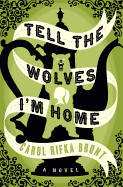 
| In the mid-1980s, 14-year-old Junie's beloved uncle Finn is the latest casualty of the AIDS epidemic. Finn, a prominent artist, introduced Junie to classical music and spent long Sundays taking her for outings and sharing secrets with her. With Finn gone, Junie soon learns her uncle also kept secrets from her, like his boyfriend, Toby, whom Junie's family blames for Finn's disease. Bereft and lonely, Junie receives a message from Toby suggesting they meet--she's the only person who misses Finn as much as he does. At first, Junie is suspicious of the man her mother claims as good as murdered her uncle, not to mention jealous of his bond with Finn. However, she has no one to confide in--not her busy parents, and certainly not her older sister Greta, who has begun subtly vandalizing Finn's final painting, a portrait of the sisters entitled Tell the Wolves I'm Home. The two strike up a friendship as heartwarming and poignant as it is unconventional and, at times, awkward. Rather than the monster she imagined, Junie finds Toby a gentle, hapless fellow, lost without Finn. Junie begins to unlock the missing pieces of her uncle's life, from his love for Toby to the root of the rift between him and Junie's mother. However, the friendship grows bittersweet when Junie realizes that Toby is also dying of AIDS. Filled with lost opportunities and second chances, Tell the Wolves I'm Home delivers wisdom, innocence and originality with surprising sweetness. Its cast of waifs and strays will steal your heart as they show each other the way to redemption. --Jaclyn Fulwood, blogger, Infinite Reads Discover: A fresh yet nostalgic debut novel about a 1980s teen who loses a beloved uncle to AIDS and finds herself by befriending his grieving boyfriend. | Dial, $25 hardcover, 9780679644194 |
| Sugarhouse: Turning the Neighborhood Crack House into Our Home Sweet Home by Matthew Batt |
| 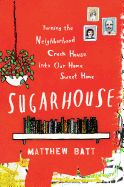 
| Matthew and Jenae Batt discover that what follows the eventual cooling of newlywed bliss isn't promising. Their best friends are divorcing, leaving them worried that a trapdoor might open under their own marriage. Then Matt loses his dad and grandmother in quick succession and, as Jenae stands by him and his family, he realizes that he still deeply loves her. Determined to improve their lives, Matt suggests getting out of their less-than-desirable apartment and buying a home. In the Sugarhouse district of Salt Lake City, they find a dilapidated former crack house whose owner's attempts at renovation have done more harm than good. Hoping to make a renovator's nightmare into the house of their dreams, Matt and Jenae buy the house and hop on the DIY ride of their lives, an uproarious journey of amateur power-tool operation, stripping floors with the equivalent of stabilized napalm, and developing a man-crush on an "artisan concrete worker." Along the way, Matt grapples with his dysfunctional family, especially his grandfather. A wealthy and incurable womanizer, Grandpa has coped with his wife's death by parading his girlfriends in front of the shocked family. Readers will laugh and cringe as Matt tries to strike a balance between convincing Grandpa to rein it in and not upsetting their relationship. (Grandpa holds the loan on their fixer-upper.) Anyone who has tackled home renovation or dysfunctional family blues will chuckle and nod knowingly at Matt's experiences. Everyone else: get out your belt sander and prepare to laugh along with this witty, lighthearted memoir. --Jaclyn Fulwood, blogger, Infinite Reads Discover: Matt Batt looks back on his adventures in home renovation and dysfunctional family relations in a hilarious memoir. | Mariner Books, $14.95 paperback, 9780547634531 |
| Darwin's Ghosts: The Secret History of Evolution by Rebecca Stott |
| 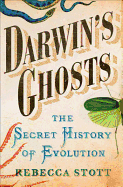 
| Rebecca Stott's Darwin and the Barnacle covered an eight-year period of Charles Darwin's life, during which he conducted research on a single, though unusual, species of barnacle found in Chile. That well-received book is the perfect precursor to Darwin's Ghosts: The Secret History of Evolution, a wonderfully written and thoroughly researched accounting of the men who influenced Darwin in his quest to define the concept of natural selection and the process of evolution. Interestingly, the first printing of On the Origin of Species by Natural Selection contained no acknowledgment of predecessors; Darwin eventually created (and subsequently modified) a list of those who influenced him for later editions of the book. Stott has expanded on this list to create a well-rounded and chronological survey of opinion regarding evolutionary thought. Stott's subjects range from the diverse writings of the self-educated Jahiz during the Abbasid Empire in 850, to the curiosities investigated by Leonardo da Vinci in the late 1400s in Milan, to the naturalist-philosophers who debated at the Jardin des Plantes in Paris in the early 19th century and ultimately to the fevered dreams of Alfred Russel Wallace, who pushed Darwin to publish his masterpiece. Though the topic might seem intimidating at first glance, Stott has a novelist's gift for storytelling (as previous novels such as The Coral Thief demonstrate). Darwin's Ghosts will make a fantastic addition to your summer reading list. --Roni K. Devlin, owner, Literary Life Bookstore & More Discover: A wonderfully written exploration of the men who paved the way for Darwin's theory of evolution. | Spiegel & Grau, $27 hardcover, 9781400069378 |
| Slouching Toward Adulthood: Observations from the Not-so-Empty Nest by Sally Koslow |
| 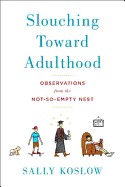 
| Many parents who looked forward to an empty nest when their kids became adults are finding themselves in a different stage, one Sally Koslow experienced as a mother. She didn't just write Slouching Toward Adulthood; she lived it as well. Interviewing more than a hundred "adultescents" and their families, Koslow reveals how baby boomers' empty nests are re-populating, becoming way-stations for adult children boomeranging back home to gain financial stability and job-hunt--or simply because they have nowhere else to go. Are these 20-and 30-somethings victims of the economy or spoiled? Did helicopter parents raise kids with a heightened sense of entitlement? And how do families cope with the progeny living with the 'rents while following adult social norms (but often strewing wet towels and dirty dishes like, well, kids)? Koslow balances candid stories shared by parents and their dependents with statistics and analysis from dozens of experts, softening hard facts with humor. In one passage, she cites bad news from a Charles Schwab study, the Bureau of Labor Statistics and FinAid.org, before concluding that "plenty of adultescents have little choice but to seek bailouts from the Bank of Mom and Dad." Slouching Toward Adulthood also speaks directly to adultescents themselves, with a look at the trend towards late marriage and childbearing. Without judging, she suggests "gentle attitude adjustment" to all parties under any roof sheltering multiple adult generations. --Cheryl Krocker McKeon, bookseller Discover: Sally Koslow's thoroughly researched overview of young adults "returning to the nest" explains how families can cope--or at least understand the situation. | Viking, $25.95 hardcover, 9780670023622 |
Overdressed: The Shockingly High Cost of Cheap Fashion by Elizabeth L. Cline |
| 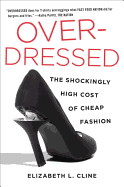 
| Flash sales. Online coupon codes. Outlet malls stuffed with discounted merchandise. These are the hallmarks of the 21st-century American fashion landscape--and, as Elizabeth Cline found, falling for them can fill consumers' closets to bursting with cheap, ill-fitting, foreign-made clothing. Dissatisfied with her own overstuffed closet of shoddy, generically trendy pieces, Cline wondered: Is there a more stylish, thoughtful and socially responsible way to dress? Why has the U.S. garment industry all but disappeared? And what is the cost--not only monetary but human and environmental--of our voracious appetite for "fast fashion?" In Overdressed, Cline researches the history of fashion (both couture and mass-market) and traces the decline of department stores and home sewing skills. She visits factories in China, the Dominican Republic and New York's Garment District, learning about the industry's often deplorable working conditions and the difficulty of staying current and maintaining quality without sacrificing the bottom line. Cline interviews workers, designers, industry executives and the heads of charities and textile recyclers (who, like the rest of us, have more clothing than they know what to do with). Educated consumers may find her naïve at first, but readers will appreciate her thorough approach. Cline urges shoppers to stop slavishly following the latest trends and instead look at clothing with a critical eye, learning to buy sustainably made, high-quality pieces and maintain them with care. This approach, while not a cure-all, proves more satisfying and ultimately less expensive--and may even create space in those crammed closets. --Katie Noah Gibson, blogger at Cakes, Tea and Dreams Discover: One woman's transformation from fast-fashion bargain hunter into a stylish, eco-conscious and thoughtful shopper. | Portfolio, $25.95 hardcover, 9781591844617 |
| The Fan Who Knew Too Much by Anthony Heilbut |
| 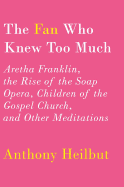 
| Anthony Heilbut (The Gospel Sound) is a Grammy-winning record producer famous for his work with gospel artists like Mahalia Jackson and Marion Williams. The eight essays collected in The Fan Who Knew Too Much reveal Heilbut's polymath talents, as he meditates in surprising ways on a wide range of topics. The leadoff essay, "The Children and Their Secret Closet," is a fascinating, revelatory history of the significant role of gays in the gospel church. To Heilbut, they are the "unacknowledged arbiters of the culture," from early key figures such as Little Ax and Norsalus McKissick, Mahalia Jackson (who preferred the company of gay men because the other kind only brought her "grief"), James Cleveland, the "king of gospel music" who would ultimately die of AIDS, and James Baldwin, the "greatest writer to come out of the gospel church." Heilbut follows with an insightful, penetrating profile of Aretha Franklin, successfully arguing that the history of black America "could be divided into pre- and post Aretha." Another essay updates the role of emigrés from Hitler's Germany in the U.S. (the subject of Heilbut's 1983 book, Exiles in Paradise) while "The Emperor of Ambivalence" praises the writings of Joseph Roth. From there, Heilbut moves on to the "fascinating phenomenon" of the soap opera, focusing on Irna Phillips, an unwed mother who "helped domesticate Freud for the masses" as the creator of As the World Turns and The Guiding Light. With an essay on male sopranos, one on the blues and finally the essay that gives the collection its title, Heilbut completes his breathtaking trip through American culture. --Tom Lavoie, former publisher Discover: A wise and learned essayist moves seamlessly (and stylishly) from music to literature and other historical reflections on popular culture. | Knopf, $30 hardcover, 9780375400803 |
|  | The Fantastic Flying Books of Mr. Morris Lessmore by William Joyce |
| 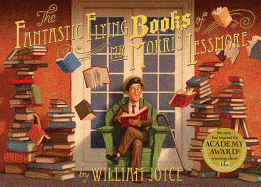 
| If you loved the Oscar-winning film that goes by the same title, you will take to heart the book on which it is based. William Joyce exploits each medium to the fullest. Morris Lessmore's life "was a book of his own writing, one orderly page after another." This serene opening scene shatters when a twister carries Morris away and sets him down in a black-and-white terrain. A woman appears in vibrant color in the sky, pulled by "a festive squadron of flying books." She sends down a volume with Humpty Dumpty featured in its pages, and the fellow leads Morris to a large building where light shines through the windows and shelves of books flutter their pages, "as if each book were asking to be opened." In Joyce's artwork, the books come to life as a full cast of characters. After Morris repairs a damaged book, he reads it to revive it. He runs across the tops of capital letters and dangles from the hook of a J. "All stories matter," he concludes. As Morris distributes books to his queued-up neighbors, they turn from black-and-white sketches to full-color portraits. In the most moving scene, the books surround the now white-haired man: "Morris Lessmore became stooped and crinkly. But the books never changed. Their stories stayed the same," and they care for him as he has cared for them. Morris stands in for all book lovers, and reminds us of the way stories live on only when we share them. --Jennifer M. Brown, children's editor, Shelf Awareness Discover: The love story of Morris Lessmore and his books, which inspired the Oscar-winning animated short of the same name. | Atheneum, $17.99 hardcover, 56p., ages 4-8, 9781442457027 |
The Year of the Beasts by Cecil Castellucci, illus. by Nate Powell |
| 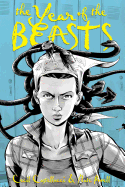 
| Alternating chapters in prose and graphic novel scenes tell a haunting tale of two sisters who allow a boy to come between them. Fifteen-year-old Tessa, her best friend Celine and Tessa's 13-year-old sister, Lulu, go to the summer carnival, where they run into football player Charlie Evans and his buddies. Tessa likes Charlie, and Celine likes boys in general, so the girls join the guys. When they pair off to enter the curiosity sideshow tent, however, Charlie winds up with Lulu instead of Tessa, and Tessa gets thrown together with Jasper Kleine. Tessa finds herself strangely attracted to Jasper, but what would people think if they knew she felt drawn to the class "weirdo?" Lulu and Charlie emerge from the tent hand in hand, which ignites Tessa's anger. Lulu and Celine bond over their boy talk, and Tessa withdraws, stealing away to meet Jasper in the woods. Tragedy strikes, and Tessa believes that her feelings of envy somehow triggered the events. Castellucci's (Boy Proof) prose brims with wise observations about the all-consuming feelings of adolescence. Tessa loves her sister and wants to be happy for her, but her jealous feelings leak out in toxic ways. Powell's (Swallow Me Whole) graphic novel chapters cast Tessa as Medusa, who turns her onlookers to stone. Teens will see that his scenes of the mythological characters take on a chilling truth in light of the tragedy at the story's core. Yet there is redemption in this page-turning tale, and an acceptance that feelings alone cannot determine humans' fates. --Jennifer M. Brown, children's editor, Shelf Awareness Discover: A thought-provoking page-turner that explores what happens when two sisters vie for the same guy. | Roaring Brook, $16.99 hardcover, 192p., ages 12-up, 9781596436862 |
Deadweather and Sunrise: The Chronicles of Egg, Book 1 by Geoff Rodkey |
| 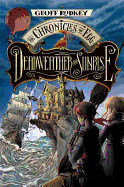 
| Those of us who grew up tormented by siblings dreamt that everything would be perfect if they'd just disappear one day. Which is just what happens to 13-year-old Egg. Ignored by his father and harassed by both his sister and brother, Egg watches all three fly off in a hot air balloon. He misses them, but finds his life so much improved on beautiful Sunrise Island (where the family takes their twice-yearly vacations) that he doesn't mind--until someone tries to kick him off a cliff. From there, this highly enjoyable book picks up speed and doesn't stop until the last page. Egg grew up across the bay on Deadweather Island, populated by pirates. But nothing could have prepared him for the world he suddenly faces, full of ancient legends and double-crossing businessmen. As he tries to figure out who wants his family dead and why, he finds that the only people he can trust are a one-armed cabin boy (who tried to kill him when they first met) and a girl he has a crush on (and whose father wants Egg dead). Rodkey's smart, fast-paced writing is a great match for fans of the Mysterious Benedict Society books who crave a little more danger. Though parts of it might be a little violent for some younger readers, older readers, especially boys, will be delighted by the author's quick wit and the story's twists and turns. They will anxiously await the next installment in The Chronicles of Egg. --Stephanie Anderson (aka Bookavore), manager of WORD bookstore Discover: The clever, funny kickoff to a swashbuckling new series. | Putnam, $16.99 hardcover, 296p., ages 8-up, 9780399257858 |
|  | We Learn Nothing: Essays and Cartoons by Tim Kreider |
| 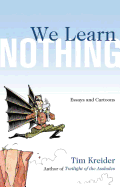 
| In We Learn Nothing, political cartoonist and New York Times essayist Tim Kreider deploys his wicked satirical genius with introspective wisecrackings that make us laugh, cry and suffer in humiliating discomfort as he maintains that, even when given the chance to make life-changing decisions, we revert to old habits. For example, a stabbing Kreider experiences as life-altering becomes, after a month or two, just another page in the book of life--out of sight, out of mind. He also muses on Lisa Nowak, the NASA astronaut who drove 900 miles--allegedly wearing adult diapers--to kidnap her lover's new girlfriend, and reminds us that "we've all worn the diaper" of unrequited love and ensuing heartbreak. Youthful bar-hopping escapades that wear thin in middle age, obsessive attachments to long-lost family and a con-artist uncle and the easy "defriending" of online friends all turn into moments of critical self-examination. "Although we may unconsciously experience [anger] as upsetting," Krieder writes in another essay, "somatically it is a lot like the initial rush of an opiate, a tingling warmth you feel on the insides of your elbows and wrists." Saving emotional tear-jerkers for last, "Chutes and Ladders" becomes Kreider's most poignant admission of unconditional love and friendship, and an assertion of the possibility of thoughtful redemption. No one is immune to Kreider's self-deprecating sarcasm. Like a tornado that rips apart the foundations of established towns, so, too, do Kreider's essays tug at our heartstrings, stripping human behavior of all its pretty, petty pretensions. --Nancy Powell, freelance writer Discover: Tim Kreider's snarky observations on the whims and wiles of human nature and a mercilessly honest discussion of why we sometimes learn nothing from our experiences. | Free Press, $20 hardcover, 9781439198704 |
|
|













 Richard Platt pays homage to the Lewis classic in his novel As One Devil to Another: A Fiendish Correspondence in the tradition of C.S. Lewis's The Screwtape Letters. Platt's underworldly grandmaster, Slashreap, mentors his nephew-protege Scardagger, a cadet fresh out of Temptation University. His tone is sharper than Screwtape's as he expounds upon contemporary demonic virtues and new tricks and strategies to corrupt 21st-century souls. Their aim is to steer one woman--an academic at an old and prestigious university--away from the tenets of heaven and into the clutches of hell.
Richard Platt pays homage to the Lewis classic in his novel As One Devil to Another: A Fiendish Correspondence in the tradition of C.S. Lewis's The Screwtape Letters. Platt's underworldly grandmaster, Slashreap, mentors his nephew-protege Scardagger, a cadet fresh out of Temptation University. His tone is sharper than Screwtape's as he expounds upon contemporary demonic virtues and new tricks and strategies to corrupt 21st-century souls. Their aim is to steer one woman--an academic at an old and prestigious university--away from the tenets of heaven and into the clutches of hell. In Job: A Comedy of Justice, science fiction writer Robert A. Heinlein skewered American evangelical Christianity. And in Lamb: The Gospel According to Biff, Christ's Childhood Pal by humorist
In Job: A Comedy of Justice, science fiction writer Robert A. Heinlein skewered American evangelical Christianity. And in Lamb: The Gospel According to Biff, Christ's Childhood Pal by humorist  The Last Testament: A Memoir
The Last Testament: A Memoir Rufus, a lovable talking Schnauzer who watches his weight, communicates the wisdom of the Divine to a widow who blames God for her grief in
Rufus, a lovable talking Schnauzer who watches his weight, communicates the wisdom of the Divine to a widow who blames God for her grief in  As a London correspondent,
As a London correspondent,  I think about my opposite in the fictional world. He's a guy who says he's always wanted a family of his own, a partner to love, children to raise. But he's pushing 40 and is still solo. Forty isn't the end of the line by any means, but it's well north of the average age for first marriages and first children.
I think about my opposite in the fictional world. He's a guy who says he's always wanted a family of his own, a partner to love, children to raise. But he's pushing 40 and is still solo. Forty isn't the end of the line by any means, but it's well north of the average age for first marriages and first children.










No comments:
Post a Comment